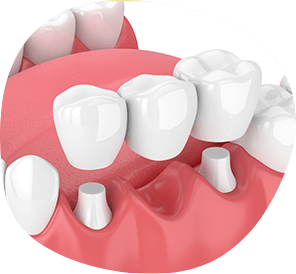Dental Bridges in College Station, TX
Dental bridges can be used for many of the same reasons that dental crowns are, but they can also be used as a minimally invasive way to replace missing teeth as well. Bridges are essentially three or more crowns that are attached together, and they are designed to protect teeth and fill in gaps in a patient’s smile while blending in beautifully with the surrounding teeth. To learn more about dental bridges or schedule your next visit, please contact us!
Contact UsContact Us
Call us at (979) 694-1200 or
fill out the form below

What are the benefits of dental bridges?
Dental bridges offer many great benefits, including:
- Complete the look of your smile
- Protect weakened and damaged teeth
- Replace teeth efficiently with minimal discomfort
- Evenly distribute the force of the bite to surrounding teeth
- Help maintain the natural shape of the face
- Prevent nearby teeth from shifting into the gap

How are dental bridges placed?
Before a dental bridge can be placed, the abutment teeth, or the teeth that will be covered by the bridge, must be prepped. This means reshaping the teeth so that the bridge will fit over them comfortably without looking bulky, and a local anesthetic is always used to completely numb the teeth and gums before this process begins. Next, impressions are taken so that the bridge can be created using custom measurements. A temporary bridge is placed, and then a follow-up visit will be scheduled to remove it and place the permanent one when it’s ready.

Who is a good candidate for dental bridges?
Dental bridges can work well for patients who are not candidates for dental implants. Implants require a healthy jawbone and for the patient to be in general good health because it is a surgical procedure that involves implanting a titanium post into the jawbone. Dental bridges do require that the patient have some natural teeth left on the arch where the bridge is going to be placed. This is because bridges are placed over abutment teeth, and they need relatively healthy teeth to hold them in place.
How long do dental bridges last?
Dental bridges can last anywhere between 10 and 15 years when they are treated well. To help your restorations last for as long as possible, we recommend visiting our office regularly for professional teeth cleanings and exams. You should also be practicing great oral hygiene at home. While dental bridges help protect weakened teeth, tooth decay can develop underneath restorations if the teeth and gums are not taken care of properly. We’ll examine your bridge during routine appointments and let you know when it’s time to replace it.
What can you not eat with a dental bridge?
Once your dental bridge has been placed, we recommend that you avoid putting too much pressure on it for a few days to allow it to settle and adhere to the teeth. You shouldn’t eat anything that is very sticky, like caramel or gummy candy, and you should chew with the other side of your mouth as much as possible. Once your dental bridge has settled, you can return to your normal eating habits and just avoid chewing things that you should never chew on, like ice, hard candy, and popcorn kernels.

